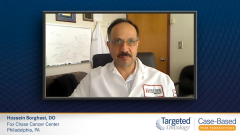
Unmet Needs and Future Directions in Extensive-Stage SCLC
Hossein Borghaei, DO, shares insights regarding future directions and current unmet needs in extensive-stage small cell lung cancer. He provides advice to researchers about the importance of clinical trials in the setting of extensive-stage small cell lung cancer.
Episodes in this series

Hossein Borghaei, DO: In places like major academic centers and a lot of the cancer centers around the country, there’s this recognition that we need better treatment options for patients with small cell [lung cancer]. Fortunately, as opposed to 5 or 6 years ago, there are a number of clinical trials ongoing in this space. There’s been a tremendous amount of interest in defining small cell, a little better from a biological point of view, meaning that we all realize that this is again a heterogeneous patient population. Some patients do well with checkpoint inhibitors; some don’t. We’re trying to identify these patients by doing some sophisticated patient-derived tumor samples and evaluating the transcription factors that could further subdivide small cell into categories that might make it easier to develop specific drugs or regimens for particular patient populations. What we’re doing with non–small cell lung cancer is based not on molecular subtypes but on other biological criteria.
At Fox Chase [Cancer Center], we have 2 phase 1 clinical trials specifically for patients with small cell. Some of these are showing early promise, but I must emphasize it’s rather early in the clinical development of these drugs. Nonetheless, we’re getting some interesting results.
Given the increase in a number of clinical trials and a better understanding of this disease, I’m very hopeful that in the next 5 or 10 years we’ll make significant progress in this disease and we will have better treatment options for our patients. But it’s going to take a lot of work. It’s going to take participation in trials and participation in biomarker studies to better define this disease. But at this point, we have to rely on the available clinical data starting with chemotherapy plus a checkpoint inhibitor at the time of initial diagnosis. And then at the second line, perhaps we’ll consider a drug like lurbinectedin, always keeping in mind that this patient population could benefit the most by participating in clinical trials. Thank you for your attention.
Transcript edited for clarity.







































